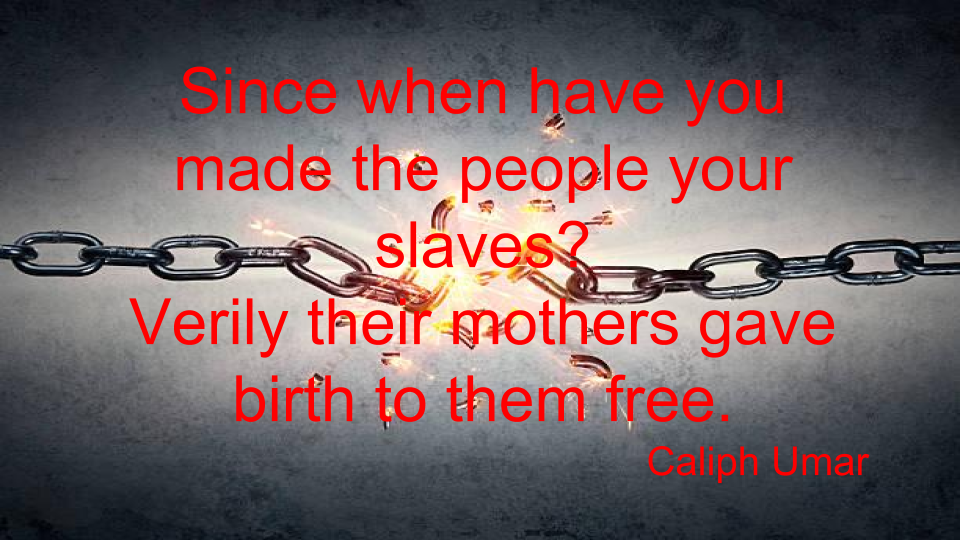A famous story illustrates the degree to which the caliphs of early Islam protected the dignity and freedom, even of non-Muslims. Amr ibn al-As was the governor of Egypt. One of his sons beat up a Coptic Christian with a whip, saying, "I am the son of a nobleman!" The Copt went to Umar ibn al-Khattab, the Muslim caliph who resided in Medina, and lodged a complaint. These are the details as related by Anas ibn Malik who used to be the personal servant of the Prophet (SAW).
We were sitting with Umar ibn al-Khattab when an Egyptian came in and said, "Commander of the Faithful, I come to you to seek refuge." So, Umar asked him about his problem and he answered,
"Amr had a custom of letting his horses run free in Egypt. One day, I came by riding my mare. When I passed by a group of people, they looked at me. Muhammad, the son of Amr got up and came to me, saying, 'I swear by the Lord of the Kaaba, this is my mare!' I responded, 'I swear by the Lord of the Kaaba, the mare is mine!' He came up to me and began beating me with a whip, saying, 'You may take her, because I am the son of a nobleman (meaning I am more generous than you).' The incident got to Amr, who feared that I might come to you, so he put me in jail. I escaped, and here I am before you."
Anas continued:
"I swear by God, the only response Umar made was to tell the Egyptian to take a seat. Then, Umar wrote a letter to Amr, saying, 'When this letter reaches you, come and bring me your son, Muhammad.' Then he told the Egyptian to stay in Medina until he was told Amr has arrived. When Amr received the note, he called his son and asked him, 'Did you commit a crime?' His son stated he has not. Amr asked, 'Then why is Umar writing about you?' They both went to Umar."
Anas narrates further:
"I swear by God, we were sitting with Umar, and Amr arrived wearing the clothes of common people. Umar looked around for the son, and saw him standing behind his father (to appear less conspicuous). Umar asked, 'Where is the Egyptian?' and he responded, 'Here I am!' Umar told him, 'Here is the whip. Take it and beat the son of the nobleman.' So he took it and beat him vigorously, while Umar said over and over, 'Beat the son of the nobleman.' We did not let him stop until we were satisfied he had beaten him enough. Then, Umar said, 'Now you must take it and hit me on my bald head. This all happened to you because of my power over you.' The Egyptian responded, 'I am satisfied and my anger has cooled.' Umar told him, 'If you had beaten me, I would not have stopped you until you had wished to. And you, Amr, since when have you made the people your slaves? Verily their mothers gave birth to them free.
Amr began to apologize, telling him, 'I did not know that this is what happened.' So, Umar turned back to the Egyptian, telling him, 'You may go, and be guided. If anything untoward happens to you, write to me.'
Despite being a Copt, the Egyptian still had his rights as a free person under Islamic rule. He cannot be hurt even by the son of the governor or be imprisoned wrongfully. Umar was particularly sensitive when it comes to the issue of justice and freedom. He quickly tried to correct the wrong behavior of his appointed Governor's son and prevent the early generation of Muslims from usurping the freedom for all citizens. These words of Caliph Umar have since become the symbol of freedom.

Hi! I am a robot. I just upvoted you! I found similar content that readers might be interested in:
https://islam.stackexchange.com/questions/38670/authenticity-of-story-of-umar-ibn-al-khattab-allowing-christian-to-beat-his-head
Downvoting a post can decrease pending rewards and make it less visible. Common reasons:
Submit